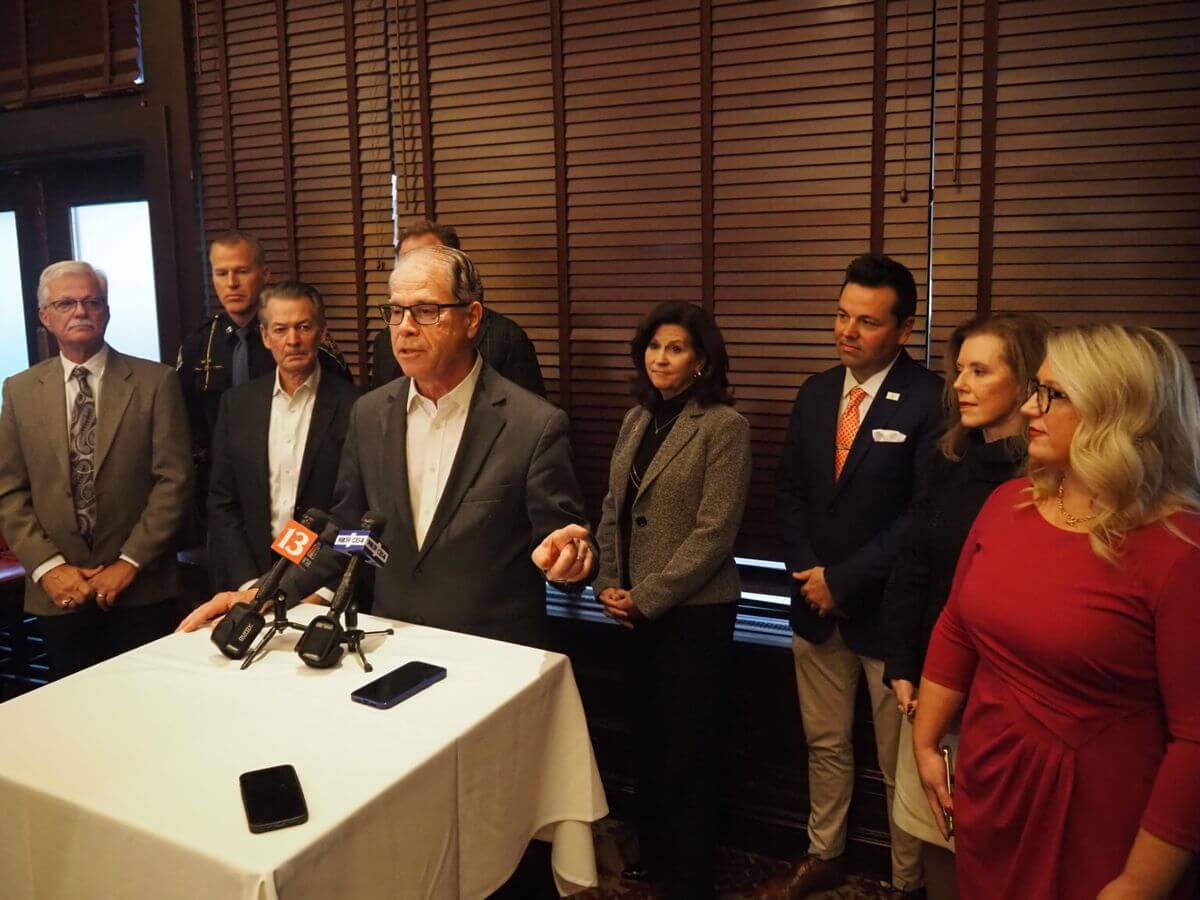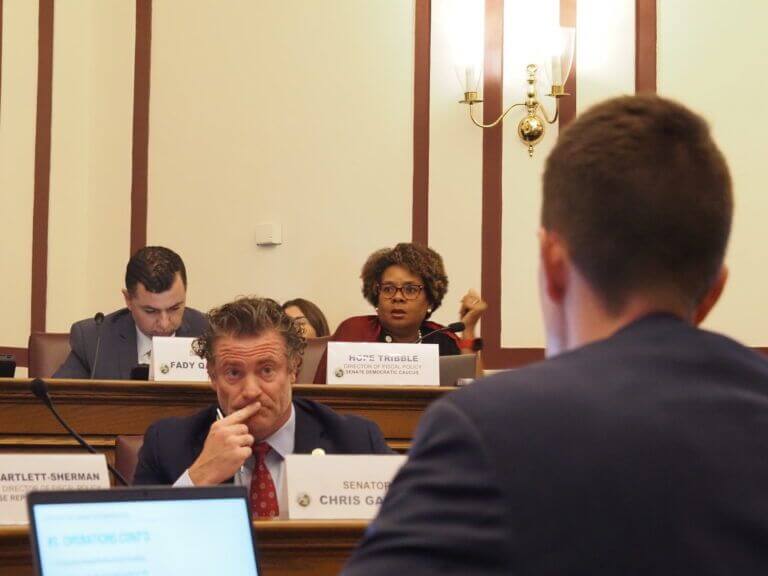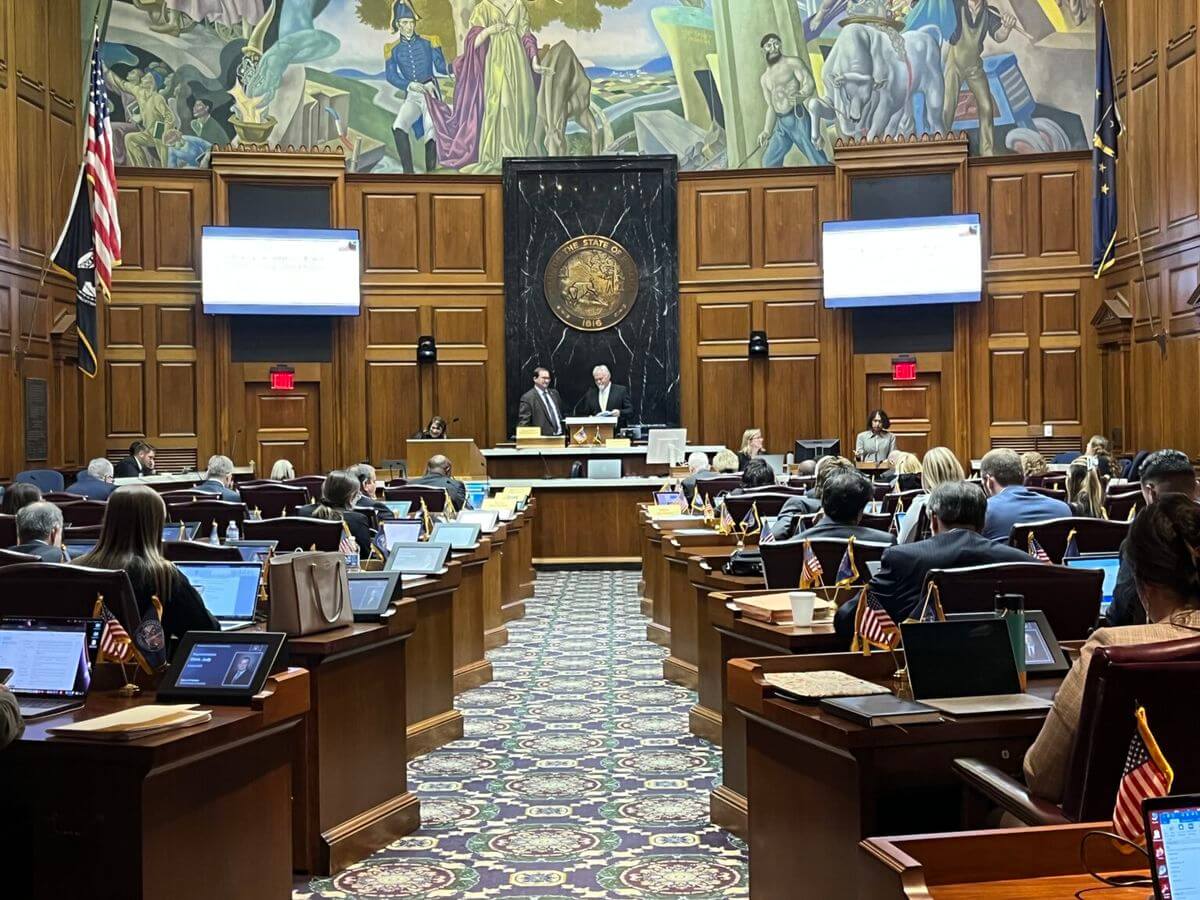1/6 Torchbearer Weekly Policy Update
Happy New Year! Thank you for letting us be your trusted source for local, state, and federal policy updates. Let’s dig in…
- Governor-Elect Braun's Cabinet Restructure
- Indiana's Fiscal Challenges and Health-related Legislative Priorities
- Indiana Budget Hearings Begin
- Indiana's Transportation Funding Challenges
- Indiana's Graduation Rates Reach New Heights
- Indiana's 2025 Tax Reform Agenda
- Share the Torchbearer Newsletter with Your Network!
- Important Dates
Governor-Elect Braun's Cabinet Restructure

Gov.-elect Mike Braun is redefining Indiana's governance structure with eight appointed secretaries who will oversee related agencies, and five of these secretaries will also lead as agency heads.
Why it matters: This dual-role strategy is part of Braun's vision to create a more entrepreneurial and accessible government structure, potentially increasing efficiency and reducing bureaucracy.
- This approach contrasts with former Gov. Eric Holcomb's administration, which included nearly two dozen cabinet members.
The big picture: The three additional secretaries also serving as agency heads now includes:
- Mike Speedy, the secretary of Business Affairs, will also lead the Department of Labor
- David Adams, the secretary of Commerce, will also lead the Indiana Economic Development Corporation
- Jennifer-Ruth Green, the secretary of Public Safety, will also be the director of Homeland Security
They join:
- Katie Jenner, who will be both the secretary and agency head of education
- Lisa Hershman, the secretary of Management of Budget who is also the director of the Office of Management and Budget
Other agency heads include:
- Suzanne Jaworowski as the secretary of Energy and Natural Resources
- Gloria Sachdev as secretary of Health and Family Services
- Matthew Ubelhor as secretary of Transportation and Infrastructure
The final cabinet members include Anthony Scott as the superintendent of the Indiana State Police, Brigadier General Lawrence Muennich as the Adjutant General of the Indiana National Guard, Lt. Gov.-elect Micah Beckwith and Chief of Staff Joshua Kelley.
In addition to Kelley, three others have been named as part of Braun’s office: Jason Johnson, the deputy chief of staff who will oversee legislative affairs; Jessica Wedgewood, the deputy chief of staff who will oversee operations; and Patrick Price, who will be the governor-elect’s legal counsel.
Twenty others will lead various agencies under Braun alongside the secretaries included above. In addition to Jenner, who will spearhead education efforts, Braun retained ten agency leaders previously appointed under Gov. Eric Holcomb.
They include:
- Holly Lambert, Insurance Commissioner
- Steve Russo, the executive director of the Indiana Public Retirement System
- Lindsay Hyer, the executive director of the Professional Licensing Agency
- Thomas Fite, the director of the Department of Financial Institutions
- James Michaels, the superintendent for the Indiana School for the Blind and Visually Impaired
- David Geeslin, the superintendent for the Indiana School for the Deaf (though he previously announced he would be retiring in 2025)
- Lindsay Weaver, Indiana Health Commissioner
- Steve Cox, the director of the Indiana Broadband Office
- Dan Huge, the chair of the Indiana Finance Authority
- and Don Lamb, the director of the Indiana State Department of Agriculture
The remaining ten newly appointed agency heads include several who previously held other positions within their departments and politicians. They are:
- Mitch Roob, the secretary of the Family and Social Services Administration. He previously ran that agency under then-Gov. Mitch Daniels.
- Lloyd Arnold, the commissioner of the Department of Correction
- Alan Morrison, the director of the Department of Natural Resources. Morrison was just re-elected to the Indiana House and will have to resign and be replaced by a caucus of party insiders.
- Kevin Garvey, the commissioner of the Bureau of Motor Vehicles
- Adam Krupp, the director of the Department of Child Services. He previously ran the Indiana Department of Revenue under Holcomb.
- Jake Adams, with the Department of Veterans Affairs
- Fred Glynn, the executive director of the Office of Community and Rural Affairs
- Brandon Clifton, Indiana Department of Administration Commissioner
- Pete Miller, the executive director of the Indiana Management Performance Hub
- Kent Abernathy, Indiana Department of Transportation Commissioner
Indiana's Fiscal Challenges and Health-related Legislative Priorities

Recent revenue forecasts suggest Indiana will experience sluggish financial growth over the next two years, primarily due to escalating Medicaid costs surpassing state revenue increases.
Why it matters: The growing Medicaid expenditures, which cover nearly two million Hoosiers, are placing a significant strain on Indiana's budget, potentially impacting funding for other essential services.
- Despite budget constraints, Sen. Ed Charbonneau remains cautiously optimistic, noting that current revenue projections still exceed existing levels, allowing for some fiscal maneuvering.
The pot picture: The debate over legalizing marijuana as a revenue source has been dismissed by Republican leaders, who highlight concerns about potential social impacts and limited fiscal benefits, as evidenced by states like Colorado.
- Gov.-elect Mike Braun is open to exploring medical marijuana but stands against recreational legalization, aligning with other Republican leaders.
- Conversely, Senate Democrats are advocating for legalization, citing potential tax revenue benefits and strong public support, especially in border districts like Sen. David Niezgodski's.
Medicaid's impact: Medicaid's expanding costs are significantly covered by federal funding, but the state's share remains substantial, prompting discussions on sustainable healthcare funding.
- Rep. Robin Shackleford stresses the importance of viewing Medicaid's success through the services it provides, advocating for increased investment in preventive care to reduce long-term costs.
Legislative outlook: The upcoming session will revisit healthcare reforms, including Sen. Tyler Johnson's efforts to streamline prior authorization processes, which are seen as a barrier to efficient patient care.
- Other legislative focuses include potential reforms on pharmacy benefit managers, healthcare provider non-compete agreements, and increasing tobacco taxes as a revenue source.
What's next: With a tight budget, revisiting tobacco policies and exploring new healthcare funding strategies are on the agenda. Lawmakers are also considering gathering more data on hospital participation in federal programs to ensure resources are used effectively.
- Efforts to address obesity, a costly issue for Indiana's economy, are also prioritized, with discussions on Medicaid coverage for related treatments like GLP-1 medications.
In Total: Indiana's legislative session will be pivotal in addressing these fiscal and public health challenges, with a focus on balancing budget constraints against the need for effective public services. (Indiana Capital Chronicle)
Indiana Budget Hearings Begin

Indiana’s State Budget Committee has launched hearings for the upcoming 2026-2027 fiscal years, with a focus on a $40 billion-plus biennial budget.
Why it matters: The hearings set the stage for critical budget allocations, impacting areas like public safety, education, and technology across the state.
Breaking it Down: Chief Justice Loretta Rush is advocating for additional funds for a statewide jail management system and security measures, while other agencies request increased funding for salaries and technology.
Adding to Context: Appeals Court Judge Paul Felix asked lawmakers for money to expand the court’s “Appeals on Wheels” traveling oral arguments program, increase salaries and keep up with information technology costs.
Furthermore: Treasurer Daniel Elliott, however, asked lawmakers to consider doubling his office’s allotment for education scholarship account (ESA) from $10 million to $20 million.
- Families can use the scholarships to pay for educational programs, therapies, services and more for their disabled children and non-disabled siblings.
- There are 600 children on the waitlist for this program.
What’s next: The committee will continue to hear requests, with an initial budget proposal expected in January.
- Lawmakers aim to address both immediate needs and long-term strategic goals. (Indiana Capital Chronicle)
Indiana's Transportation Funding Challenges

As Indiana faces a looming transportation infrastructure funding shortfall, reliance on motor fuel taxation is proving unsustainable due to the rise of fuel-efficient and electric vehicles.
Why it matters: The state's transportation funding is heavily reliant on fuel taxes, which are declining as more Hoosiers switch to efficient vehicles. This trend threatens the financial stability needed for maintaining roads and bridges.
- Inflation compounds the issue, reducing the purchasing power of available funds.
State-level prospects: Lawmakers are considering alternatives to the outdated gasoline excise tax model. Discussions include tying registration fees to vehicle age or efficiency, taxing electric vehicle charging, and exploring road user charge systems.
- Rep. Jim Pressel emphasizes the need to maintain road-funding revenue streams without penalizing specific demographics, like electric vehicle owners and truckers.
Local challenges: Cities and counties face significant funding gaps for road and bridge maintenance, with estimates suggesting a $500 million annual shortfall just to maintain current conditions.
- Community Crossings and Local Trax programs are being re-evaluated to better support local infrastructure needs.
What's next: As the General Assembly session begins, legislators aim to identify fair and effective funding solutions. Pressel's proposed bill will explore diverse ideas like ride service fees and equal-opportunity road user charges.
- The goal is to establish a sustainable funding model that balances state and local needs while adapting to technological advancements in transportation. (Indiana Capital Chronicle)
Indiana's Graduation Rates Reach New Heights

INDIANAPOLIS - More than 90% of Indiana seniors graduated from high school in 2024, marking a record high according to the Indiana Department of Education.
Why it matters: This achievement reflects significant progress in educational outcomes, highlighting improvements across diverse student groups and reinforcing the state's commitment to educational excellence.
- The graduation rate for Black students increased from 82.43% in 2023 to 83.88% in 2024.
- Hispanic students saw an increase from 86.41% to 87.83%.
- English learners improved from 87.72% to 89.48%.
The big picture: Indiana's overall graduation rate of 90.23% surpasses the previous record set in 2014, with notable gains among students receiving special education services and those from economically disadvantaged backgrounds.
- Special education students' graduation rate rose from 83.24% to 85.30%.
- Students receiving free and reduced-price meals saw their rate jump from 88.74% to 91.52%.
What's next: Indiana Secretary of Education Katie Jenner emphasizes the importance of maintaining this momentum in 2025, focusing on continuous improvements in literacy and reducing absenteeism to further boost educational outcomes statewide. (Inside Indiana Business)
Indiana's 2025 Tax Reform Agenda

After two years of debate, Indiana lawmakers are unveiling tax reform bills for the 2025 session, with over 300 bills filed so far.
Why it matters: These tax reforms aim to address financial burdens on Hoosiers by adjusting property, income, and sales taxes. Key proposals focus on property tax relief and income tax reductions for various demographics.
- Gov.-elect Mike Braun plans to cap property tax increases at 2% annually for seniors and low-income families, providing significant relief.
Property tax focus: Several bills aim to ease property tax burdens through deductions and credits, particularly for seniors and veterans.
- House Bill 1028 and House Bill 1075 propose freezing property tax liabilities at 2025 rates, with specific provisions for disabled veterans and seniors.
- Senate Bill 105 suggests updating property values every four years to stabilize tax bills, while Senate Bill 41 seeks to remove caps on veterans' deductions.
Income tax reductions: Proposed bills include credits for home renovations and increased deductions for renters and teachers.
- House Bill 1018 incentivizes repairs on older homes, offering credits up to 55% of renovation costs.
- Senate Bill 25 proposes raising the renter's deduction, while Senate Bill 154 increases the teacher's supply credit and broadens the child tax credit to include public school families.
Other tax proposals: House Bill 1042 aims to remove sales tax on essential items like feminine hygiene products, potentially reducing state revenue by $11 million. (IBJ)
Share the Torchbearer Newsletter with Your Network!

Not signed up for our weekly newsletter? Sign up today!
Important Dates:

- Wednesday, January 8th - First day of the 2025 legislative session
- Thursday, January 9th - Senate bill filing deadline
- Monday, January 13th - Governor-elect Braun’s swearing-in ceremony
- Tuesday, January 14th - House bill filing deadline
- Monday, January 20th - MLK Day (no session)
- Wednesday, January 29th - State of the State
- Monday, February 17th - House and Senate Committee Report Deadline
- Wednesday, February 19th - House and Senate Second Reading Deadline
- Thursday, February 20th - House and Senate Third Reading Deadline
- February 24th - 28th - Crossover Break (no session)
- Thursday, April 10th - House and Senate Committee Report Deadline
- Monday, April 14th - House and Senate Second Reading Deadline
- Tuesday, April 15th - House and Senate Third Reading Deadline
- April 16th - April 24th - Conference Committees
- Thursday, April 24th - Anticipated Sine Die
- Tuesday, April 29th - Sine Die
